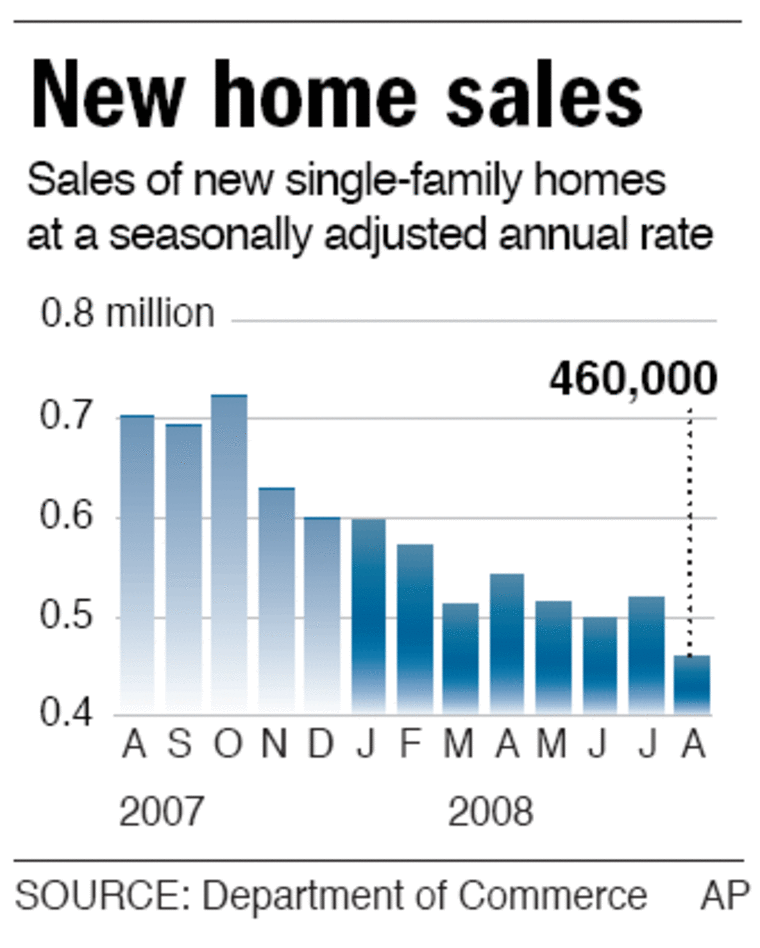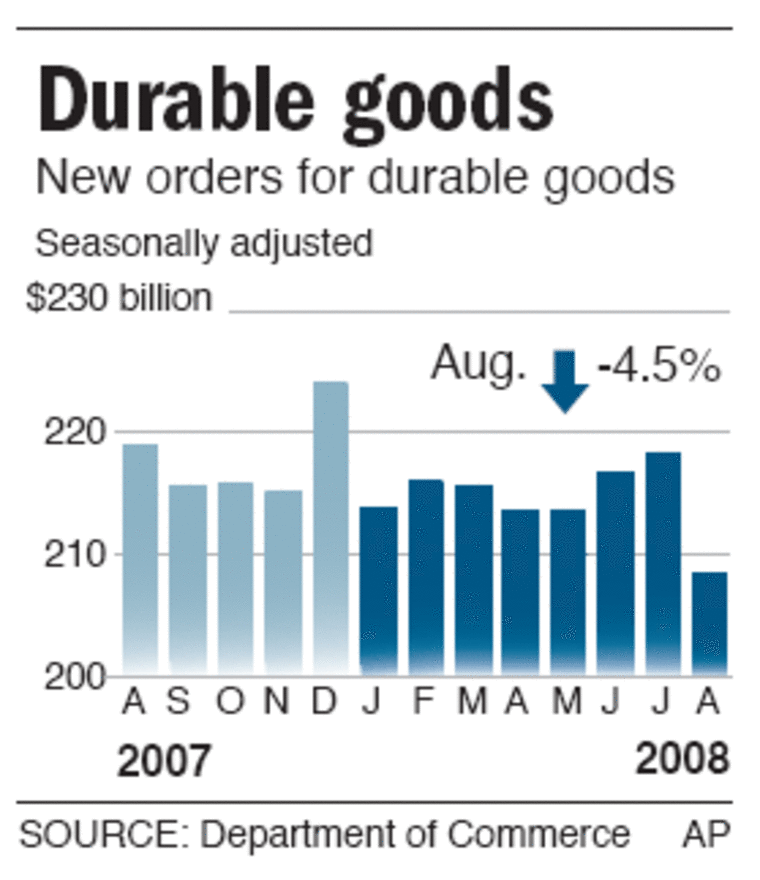Weekly jobless claims surged to the highest level in seven years, durable goods orders took a bigger-than-expected tumble and new home sales plunged to the slowest pace in 17 years, according to government data released Thursday.
The latest trifecta of bad news about the economy raised new worries about a possible recession and underscored the concerns that are driving Congress and the White House to reach agreement on an historic bailout of the financial system.
The Labor Department reported that jobless claims jumped by 32,000 to a seasonally adjusted 493,000 last week, the highest level since shortly after the Sept. 11, 2001 terrorist attacks and far above what economists had been expecting.
Labor Department analysts said that Hurricanes Ike and Gustav added about 50,000 claims, but even discounting the adverse impact from job disruptions in Louisiana and Texas, the four-week average for claims rose to 445,000, the highest it has been since November 2001, the month the last recession ended.
In a second report, the Commerce Department said that new orders to factories for big-ticket manufactured goods fell by 4.5 percent last month, led by a big drop in demand for airplanes but also reflecting weakness in everything from autos to primary metals and machinery.
It was the largest setback since a 4.7 percent fall in durable goods orders in January and raised worries that the weakening economy was causing corporations to cut back on their investment spending plans.
The third weaker-than-expected report showed that new home sales plunged by 11.5 percent in August, a much bigger decline than the 1 percent dip that had been expected. It pushed sales down to a seasonally adjusted annual rate of 460,000, the slowest pace since January 1991.

The average price of a new home fell in August by 11.8 percent to $263,900, the biggest one-month drop on record. The median home price was down 5.5 percent to $221,900.
Analysts said the trio of bad reports meant the third quarter was ending on an extremely weak note and raised the risks that the October-December quarter will actually slip into negative territory. Many economists believe the gross domestic product will be negative in both the final three months of this year and the first three months of 2009, meeting the classic definition of a recession.
GDP measures the value of all goods and services produced within the U.S. and is the best barometer of the country’s economic health.
In a nationally televised speech Wednesday night, President Bush said the current credit crisis could trigger a “long and painful recession” unless Congress acts quickly to pass a $700 billion bailout plan for the nation’s financial system.
Bush and the two men fighting to succeed him — Sens. Barack Obama and John McCain — met at the White House on Thursday with congressional leaders trying to work out differences on the bailout plan. There were signs that conservative Republicans were balking at an agreement in principle that was announced after a congressional negotiating session earlier in the day.

Some analysts said the weakening economic reports raised the possibility that the Federal Reserve will move to cut interest rates, possibly in an emergency move between meetings.
“It is very possible the Fed may choose to lower rates as soon as the White House signs off on the bailout package next week just to give the financial markets, businesses and consumers and extra psychological boost,” said Bernard Baumohl, chief global economist at the Economic Outlook Group.
David Wyss, chief economist at Standard & Poor’s in New York, said the surprisingly big jump in jobless claims raised the likelihood that next week’s unemployment report would show the economy shed 100,000 jobs in September, the ninth straight month of job losses and the biggest one-month decline so far.
In the last week, drug maker Schering-Plough Corp. said it plans to cut 1,000 sales jobs to reduce costs, while the nation’s largest chicken producer, Pilgrim’s Pride Corp., said it would reduce another 100 jobs on top of 600 cut positions it had previously announced.
Wyss said he was forecasting that the GDP would shrink in both the fourth quarter and first quarter before starting to recover in the spring as the country undergoes the first recession since the 2001 downturn.
The big drop in new home sales followed news Wednesday that sales of existing homes were down 2.2 percent in August to a seasonally adjusted annual rate of 4.91 million units. Both segments of the market remain under pressure from the steepest housing downturn in decades.
That housing slump has contributed to a record surge in mortgage defaults, leading to billions of dollars in losses by financial firms and spawning a severe credit crisis that has made it hard for companies and consumers to get the loans they need.
